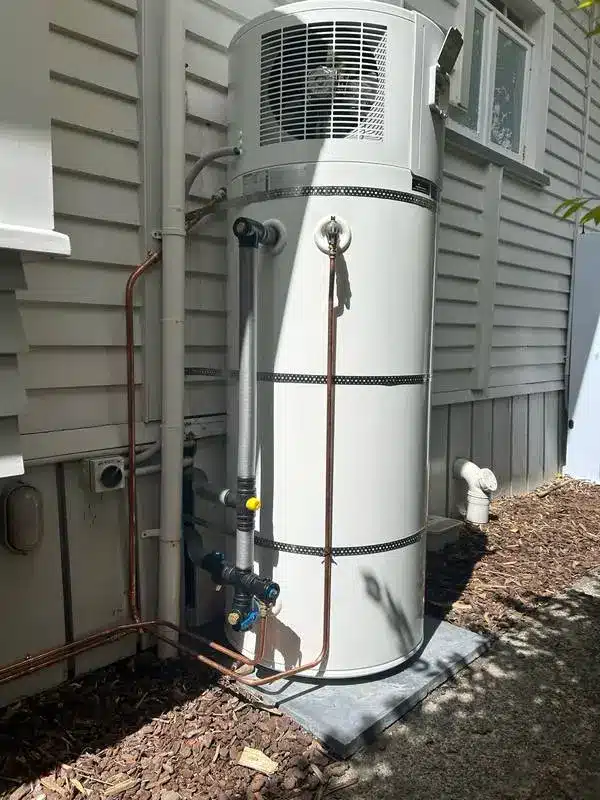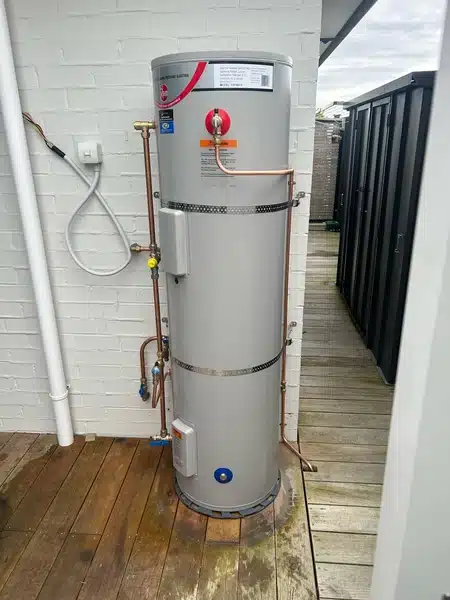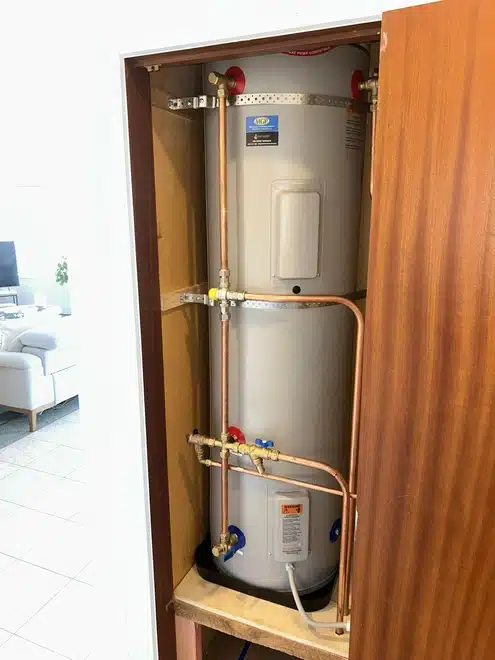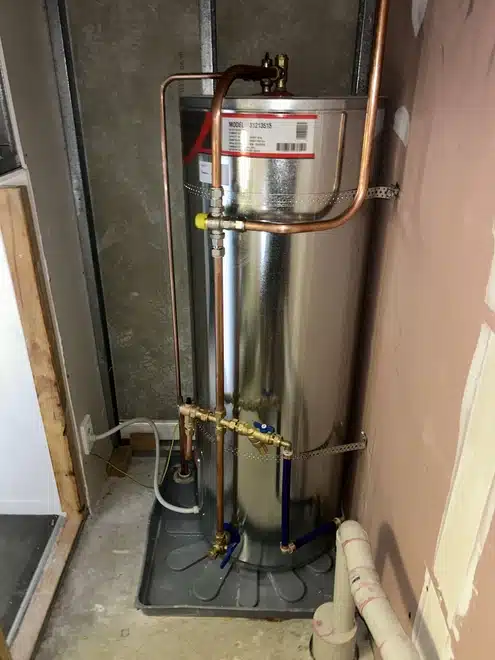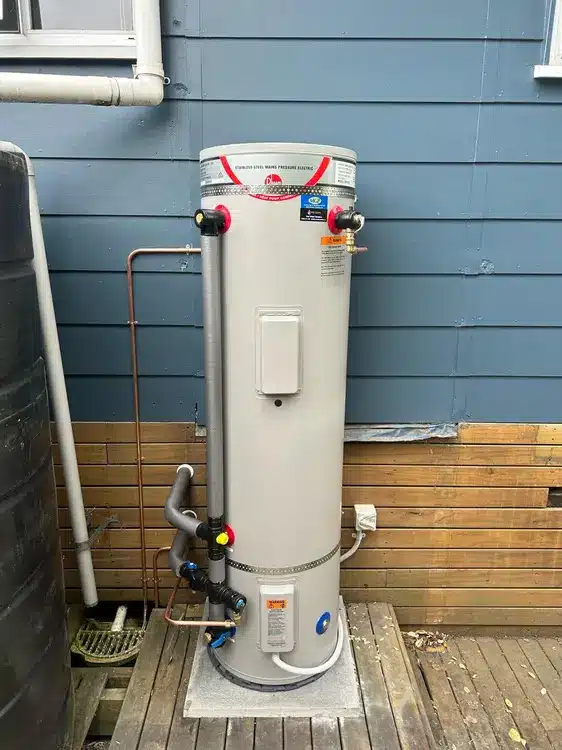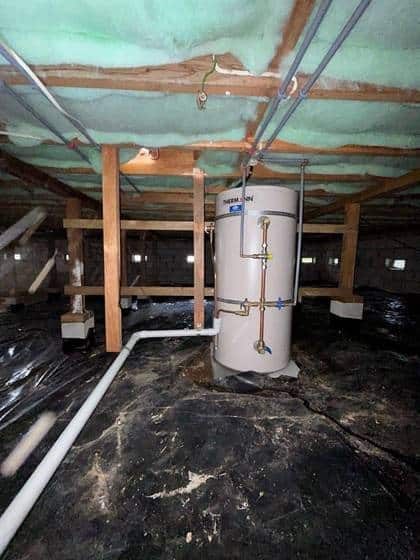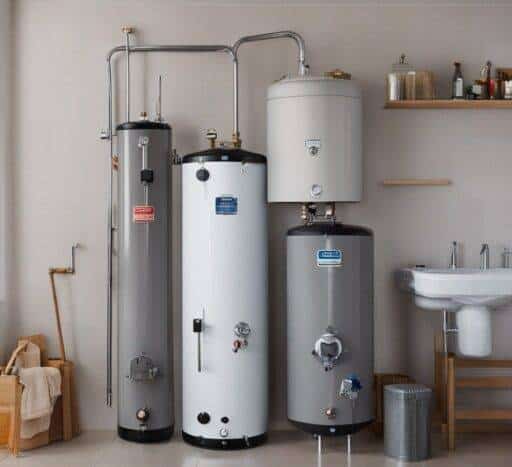How Do Heat Pump Hot Water Systems Work?
A heat pump water heater works like a refrigerator in reverse – it uses electricity to extract heat from the surrounding air and transfers that heat to the water stored in an insulated tank. This makes them extremely efficient as they use naturally occurring heat rather than generating their own. A compressor and evaporator make up the heat pump which draws ambient air across the evaporator. As this air passes over, it cools, and the heat is absorbed. This warmth gets moved via refrigerant to the compressor where it’s concentrated then pumped into the hot water tank.
Solar hot water uses free energy from the sun to directly heat water. A solar collector panel sits on the roof containing copper pipes or tubes. The sun’s radiation heats an absorber on this panel which consequently heats the water circulating through the pipes. This then flows down into an insulated storage tank ready for use in your home. Most solar systems also have a secondary heating method like gas or electric boosters to ensure there is hot water even when sunshine is limited.
Key Factors When Comparing Solar & Heat Pump Hot Water
When weighing up a heat pump system against solar hot water, there are five main considerations:
Upfront costs and long-term savings
Energy efficiency and running costs
Ideal locations and climate conditions
Maintenance requirements
Expected lifespan
Upfront Costs and Payback Period
While a new solar hot water unit costs on average around $5000 to buy and install, their extended lifespan sees owners recouping the initial investment over years of energy bill savings. Over a 15-year period a solar system can save $4000 compared to an electric storage option. Heat pumps start from around $3000 making them more affordable to purchase upfront. But with higher running costs than solar, it takes over 9 years for cumulative savings to outweigh the lower initial spend.
In terms of payback, solar hot water pays itself off quickest, taking as little as 4-6 years to break even. While heat pumps offer the next fastest payback taking around 7 years to offset the system cost through energy savings. So, when weighing up the higher start-up cost of solar against shorter payback time, you need to consider how long you plan to stay in your home. Solar makes more financial sense if you use the system over 10+ years.
Energy Efficiency and Running Costs
Solar water heating uses the sun’s free and abundant energy making it extremely cost-effective to run. Even with electric or gas backup heating when sunshine is scarce, running expenses remain very low. Overall solar hot water systems can help reduce water heating bills by 50-70%.
Modern heat pump models are much more energy efficient than other electrical options like traditional hot water cylinders. Their coefficient of performance or COP compares energy input to heat output – the higher the number the better the efficiency. Good heat pump systems have a COP around 3-4 meaning for every 1kW of electricity inputted they produce 3-4kW of heat. This allows them to heat water 2-3 times more efficiently than conventional electric water heaters. But heat pumps still rely solely on electricity to function which solar water does not.
Ideal Locations and Climate Conditions
New Zealand enjoys an abundance of clear, sunny days making solar a very viable option in much of the country. Solar works best where homes have a sunny, north-facing roof space. If your house lacks good solar access, heat pumps can be an easier fit.
Heat pumps perform well year-round even in places like Southland and Central Otago with colder winters and milder summers. Just be aware if locating the external unit outside it will need protection in severely cold or frosty climates. Places like Nelson, Blenheim, Napier, and Hastings with very high sunshine hours are extremely well-suited to solar heating.
Before deciding its worth checking NIWA maps for average solar radiation levels in your region. Areas with at least 16-18MJ/m2 (megajoules per meter squared) are recommended for efficient solar systems. You can also calculate tailored solar hot water savings based on your property’s specifics and dimensions using the EECA’s online calculator.
Maintenance Requirements
One of the advantages of solar hot water is the systems require very little maintenance across their long 25+ year lifespan. As there are few moving parts and no refrigerants or electronics, you just need to occasionally check pipes and connectors and ensure the glass surface of your solar collector stays clean. Some preventative maintenance like anode rod replacement every 5-8 years will prolong tank life.
Modern heat pumps are also very reliable and need little user intervention. But refrigerant levels, condenser coils, and air filters should be professionally checked every 3-5 years. Fans and compressors will likely require repair or replacing at some stage too. Proper placement and yearly cleaning of dust and debris from the outdoor unit is advisable as well.
Expected Lifespan
Commercial solar hot water systems come with warranties of 10 years upwards but have proven lifespans of 25-30+ years. With copper pipes and anodised aluminium absorber panels, solar collectors last at least 20-25 years before heat transfer efficiency starts naturally declining. And the storage tanks often outlast collector lifespan by 5-10 years. Making solar an extremely durable, long-term investment that can easily serve a household for 20+ years.
The lifespan of a heat pump water heater is estimated to be around 15 to 20 years. While tanks can last upwards of 20 years, the compressor and heat pump unit itself will likely require replacing at the 15-year mark. Refrigerants and electronics also degrade over time. And the fan motors have a shorter 10–15-year operating life.
Solar Hot Water vs Heat Pump: Which Should You Choose?
So, weighing up all the variables, what’s the better hot water system for a typical NZ home?
For most Kiwi homes, solar water heating makes the best long-term choice offering superior energy efficiency and some of the quickest cost savings. While heat pumps feature lower upfront costs, solar hot water returns the investment much faster through energy bill reductions and has a longer functional lifespan.
Solar also harnesses free, renewable energy from the sun rather than drawing from finite resources used for electricity like coal and gas. So it’s an eco-friendlier, more sustainable system that helps households reduce their carbon footprint. That said heat pumps are still 2-3 times more efficient than conventional electric hot water heating.
Ultimately solar works best when homes have ample north-facing roof space and are located in sunnier regions of NZ. If your existing hot water cylinder or roof positioning limits solar collector installation or you live somewhere with frequently overcast and rainy weather, a heat pump system can be the more practical option. Well-suited heat pump models with high COP ratings provide the next most energy efficient water heating after solar.
Use our contact us page to reach us and we will be more than happy to discuss your hot water situation. Or give us a call on 0800 497658.
At Hot Water Solutions all we do is hot water!

